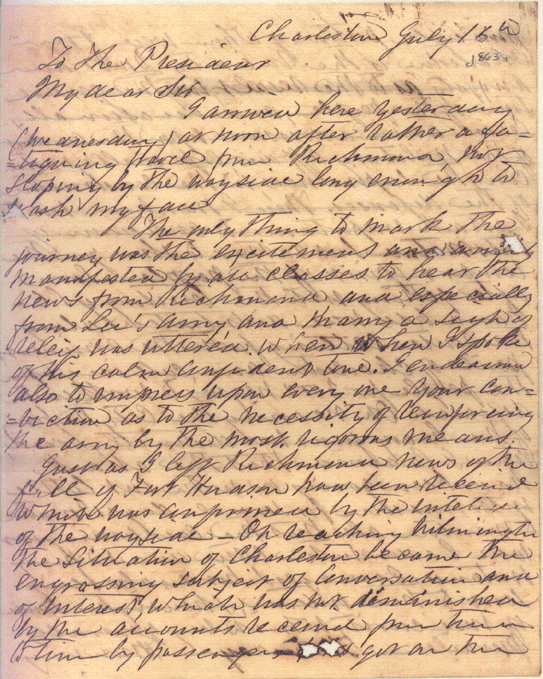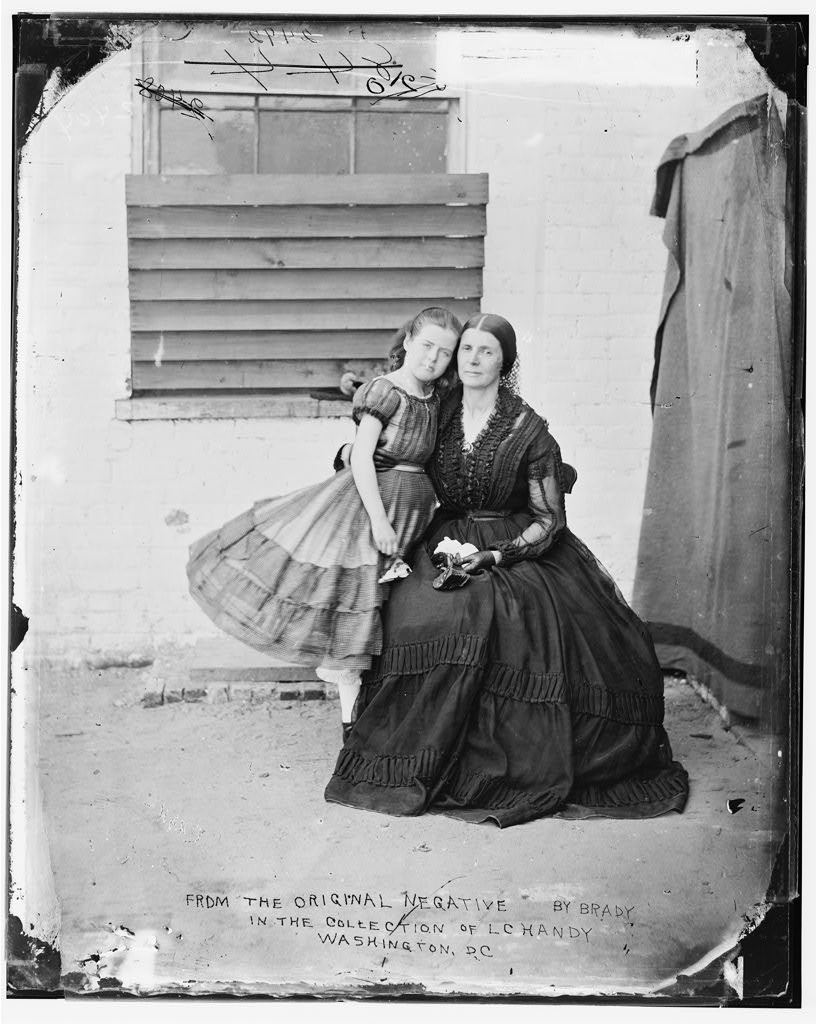Rose O'Neal Greenhow was a well-connected widow and prominent hostess in Washington, D.C. before aligning herself with the Confederacy and solidifying her legacy as a Confederate spy. Below is an excerpt of a letter she wrote to Confederate President Jefferson Davis where she discusses past battles and current plans and sentiments about Charleston, South Carolina.
Charleston July 16th [1863]
To The President
My dear Sir.
I arrived here yesterday (Wednesday) at noon rather after a fatiguing travel from Richmond, not stoping by the wayside long enough to wash my face.
... The impression here that Charleston is in great danger is sustained by the opinion of the Military Authorities. I saw Genrl. BeauregardPierre Gustave Toutant Beauregard (usually known as P. G. T. Beauregard), originally from Louisiana, was a brigadier general in the Confederate army. He had served in the U.S. Army during the Mexican-American war and had also taught at the U.S. Military Academy at West Point. When Louisiana seceded in 1861, Beauregard left West Point and returned to New Orleans. He was the victor in the First Battle of Bull Run in July 1861. who came to call upon me, and had a very long conversation with him, and he is deeply impressed with the gravity of the position. He says that three months since he called upon the planters to send him 2000 negro's to work upon the fortifications at Morris IslandMorris Island is located in Charleston Harbor. Fort Wagner was built on Morris Island and protected Charleston from Union attacks. and other points and that he could only get one hundred, and that they would not listen to his representations as to the threatened danger. That he considered the late successes against the Yankee Iron Clads, as a grave misfortune, as the people in despite of his protests to the contrary have been lulled into a fatal security -- That the Yankees are in force upon a position of Morris Island from which it will be impossible to dislodge them, as they are protected by the sea and marsh on one side and by their Iron Clads on the other that we must eventually abandon the portion of the Island which they now occupy, but that he is erecting works on James Island which will command those works, which he will destroy and render it impossible for them to reconstruct.
He says the fall of Charleston now depends upon his ability to carry out his plans. He proposes and has commenced (for yestery 1500 negro's came in and today the balance of the requision) a line of fortifications which will completely envelope Morris Island and surround them as he says "by a line of fire" in this form [small diagram of rebel forces surrounding Morris Island in a u-shape] but to effect this heavy guns and mortars are necessary, and without them Charleston must fall.
He told me that he was making out a report to be sent to the War Dept -- and made use of the remark that the "Yankees had started [to] march upon us—" I said how is that Gen. with your great sagacity? He sayed that they had built a tower of some 80 feet upon some hill, which completely overlooked Charleston and his position and thus so soon as they found that he had sent off a portion of his forces south they commenced re-inforcing believing him weaker than he even was -- that if he had had the force in the first instance when they landed on Morris Island he could have prevented it. Many say that he could have done it and should do so yet, even now that his loss will be heavy. The skirmishing continues active on both sides.
The enemys shells being principally directed to Fort WagnerThe Union tried twice to take Fort Wagner, both times suffering heavy casualties. Realizing that they could not take the fort by force, the Union decided to lay siege so that no food or military supplies could be brought to the Confederate troops stationed on the island. Facing starvation and a dwindling supply of ammunition, the Confederacy deserted Fort Wagner in September 1863. The second Union assault on Fort Wagner, two days after Greenhow wrote this letter, was led by the 54th Massachusetts, an African-American Regiment, and was shown in the 1989 film Glory. -- I am told just now by a reliable party that the enemy has commenced throwing up works in the middle of the Island and have commenced to dig and that Fort Wagner is greatly endangered thereby. Beauregard is at Morris Island and other points Superintending and directing. He told me that he had plenty of men for the present, and thus only needed the heavy guns & mortars.
I have talked with a number of men of high military position as also prominent Citizens, and altho they blamed Beauregard in the first instance for inactivity in not fortifying the known weak point of Charleston, and that he should have allowed himself to be taken at a disadvantage. All now concur in believing that every effort will be made to defend and save the City -- her fate stands trembling in the ballance. Beauregard says that he made a requisition for heavy guns some months since and sent Maj. Blanding in to Richmond with the Sec. of War -- But that they will be no time now.
RiplyRoswell S. Ripley was a brigadier general in the Confederate army. Originally from Ohio, Ripley served in the U.S. Army during the Mexican-American war. In 1853, he retired from the U.S. Army and moved to Charleston where he became a wealthy businessman. He joined the Confederate army after South Carolina seceded and was in charge of the coastal defense of Charleston in 1861-1862. In 1862, he was transferred to Virginia, where he fought in several battles. He was wounded in the neck but recovered, and was sent back to Charleston to once again supervise the defense of that city. is severely sensured by many as having been too busy with his cotton speculations -- until very recently to think of fortifications, also that a point of etiquette between some corps have left his defenses in this deplorable state of weakness. I tell you this as I think it right that you should know all that is said; and that it is not idle street gossip but comes to me from men in high position. At the same time I know you to be too wise to be unduly influenced by the best founded gossip, without more substantial grounds. But of one thing be assured that every body is wide awake just now -- and no one ignorant of the danger to the Palmetto City -- which, by the way, takes its name from their being but one tree of that discription visible.
Gen. Bonham is here in active Co-operation with Beauregard. Clingman's Brigade made the attack night before last and behaved very well -- so far we have repulsed them every where -- but alas their overwhelming numbers are not sensible even of heavy loss -- our own loss always very slight. The Yankee guns are of greatly improved range. Their guns larger and ther [sic] Iron Clads far more formidable than at first[.] Some of their shells pass over Fort Sumpter. The attack is evidently in earnest and made with more method and determination, and with greatly improved practice.
Primary Source Citation:
Greenhow, Rose O'Neal. Rose O'Neal Greenhow to Jefferson Davis, Wilmington, NC, July 16, 1863. In Rose O'Neal Greenhow Papers. Special Collections Library, Duke University, Durham, NC. https://library.duke.edu/rubenstein/scriptorium/greenhow/1863-07-16/1863-07-16.html


